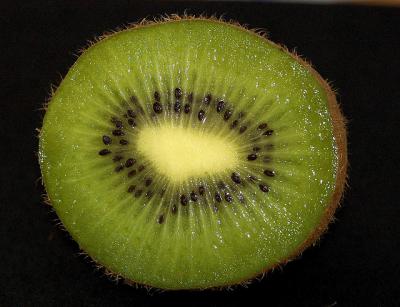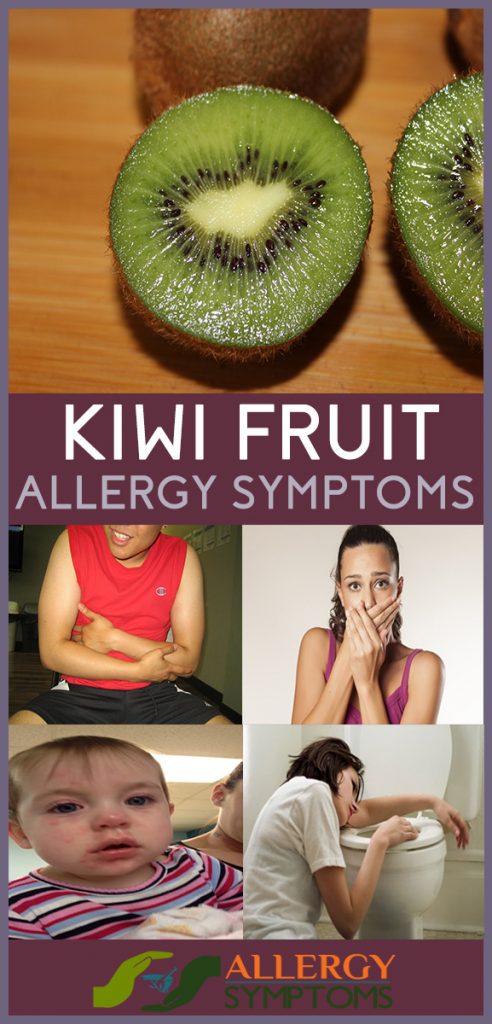
Kiwi fruit is known for its high nutritional value and low calories. This small, brown and fuzzy fruit got its name because it resembles national bird of New Zealand. Kiwi is rich in Vitamin A, C, E, B-carotene and omega fatty acids which can effectively reduce blood pressure, makes your heart healthy, reduce formation of kidney stones and enhance collagen production. (1)
Kiwi allergy is not infrequent particularly in people with other allergies. Among older children and adults, an allergic reaction to kiwis generally characterizes cross reactivity to another allergy aggravating substance, or allergen. Due to the cross reactivity, some of the people with an allergy to birch pollen, grass pollen or latex are commonly also allergic to kiwi.
Kiwi allergy symptoms are diverge from minor to potentially life-threatening and it can affect skin, respiratory, digestive and circulatory system.
Kiwi allergy is essentially an oral allergy syndrome. It can be of a more stark type in some of depending on reactivity of their immune system to the fruits.
But proteins in this fruit may react with your immune system resulting in allergic symptoms. Recent reports show that kiwi fruit allergy is creeping to become one of the common allergies in UK. The Anaphylaxis Campaign report says that 6% of their members have symptoms of kiwi allergy.
What Causes Kiwi Allergy?
This allergy can be classified into two types. One type is that people experience allergic symptoms when they touch or eat this fruit. Second type is oral allergy syndrome. The reaction erupts when pre-existing pollen allergens react with certain raw fruits.
Kiwi allergy is caused mostly due to malfunctioning of the immune system. As a response to attack, antibodies are produced in a large number. These immunoglobulin E anti bodies engulf the foreign antigens. They will give signal to immune system to release histamines and other harmful chemicals. These are solely responsible for producing the allergic reactions throughout the body.
Kiwi allergy is also linked to the pollen food syndrome and latex allergy. Those who are allergic to tree pollen, they are most likely to get allergic symptoms to kiwi because of the resemblance in a protein building of both pollen as well as kiwi.
But, how it all starts?
Your immune system treats fruit proteins as harmful external substances. So it initiates response by releasing antibodies, which then leads to production of histamines. This reaction between harmless proteins and combating antibodies results in allergic symptoms which range from mild to severe situations.
As mentioned, people who’re allergic to pollen may develop kiwi fruit allergy because of similar protein structure. In the same way, you may expect allergic reaction with other ingredients that has identical substances.
Also read: Symptoms of Cinnamon Allergy
Symptoms of Kiwi Fruit Allergy
Oral allergy syndrome linked to kiwi allergy commonly results in mild symptoms like:
- Swelling of lips, eyes and face
- Experiencing burning or tingling sensation over tongue and around the mouth
Symptoms related to skin include:
- Hives, welts
- Itching and rashes over different parts of the body
- Eczema
- Swelling
- Redness of skin
Respiratory and digestive issues include:
- Wheezing
- Vomiting
- Nasal congestion
- Diarrhea
- Trouble in breathing
- Nausea
Some of these symptoms can be serious and lead to anaphylaxis, which is very dangerous. Other symptoms that can lead to anaphylaxis are as follows:
- Sudden drop in blood pressure
- Fainting or losing consciousness
- Increase in heart beat
- Extreme difficulty in breathing
- Swelling of throat and airways
Note: Patient with above mentioned symptoms must need immediate medical attention.
Skin Symptoms:
Like so many other kinds of allergies, kiwi allergy can be also causing you some of skin symptoms. Confined with itchiness and hives that may be developing on hands after handling of kiwi fruits.
Even facial hives and itching can occur in sensitive people after being kissed by someone who has freshly eaten a kiwi fruit. Widespread hives, generalized itchiness and flushed or pale skin frequently occur with a more severe allergic reaction to kiwi fruit. These are usually accompanied by the other symptoms as well.
Digestive System Symptoms:
The digestive symptoms commonly occurr with a moderate to severe allergic reaction to kiwi fruit. A systemic reaction refers to one of the most affecting things to your body as a whole rather than just the area of the direct contact, as in OAS.
Possible symptoms that includes are abdominal pain, stomach cramps, vomiting, diarrhea and nausea. Where Oral Allergy syndrome symptoms are occurring almost instantaneously, digestive system symptoms might be delayed for up to 2 hours after eating kiwi fruit.
Treatment of Kiwi Allergy
Treating kiwi allergy symptoms in the beginning is very vital to stop the response from getting it worse. The initial line of the resistance is to avoid the kiwi fruit. Some of the mild symptoms are mostly treated with recommended anti-histamines.
Anaphylaxis reaction is noticed to be a possibility, some of the individuals are often recommended to carry injectable adrenaline (epinephrine) and anti-histamine prescriptions, medications along with them always, this precautionary medicine should be carried by those who are suffering from kiwi allergy.
Even after administering the adrenaline injection, it is always advisable to visit the hospital for a complete follow up and to monitor the emergence of any secondary reaction. The injectable adrenaline is simple to use and this can be very easily self-managed suitably if the method is learnt from medical physician.
Important points
- One of the best ways to prevent kiwi allergy is to avoid consuming this fruit.
- Avoid other substances that have identical protein structure. It can be fruit, vegetables or store brought products.
- Take your doctor’s advice on how to prevent the kiwi fruit allergy.
- Mild symptoms can be treated using anti-histamines, but for severe signs you need medical attention.
- If you detect anaphylaxis reaction, then immediately reach doctor or allergist for treatment. Don’t wait to try home remedies its life-threatening.


